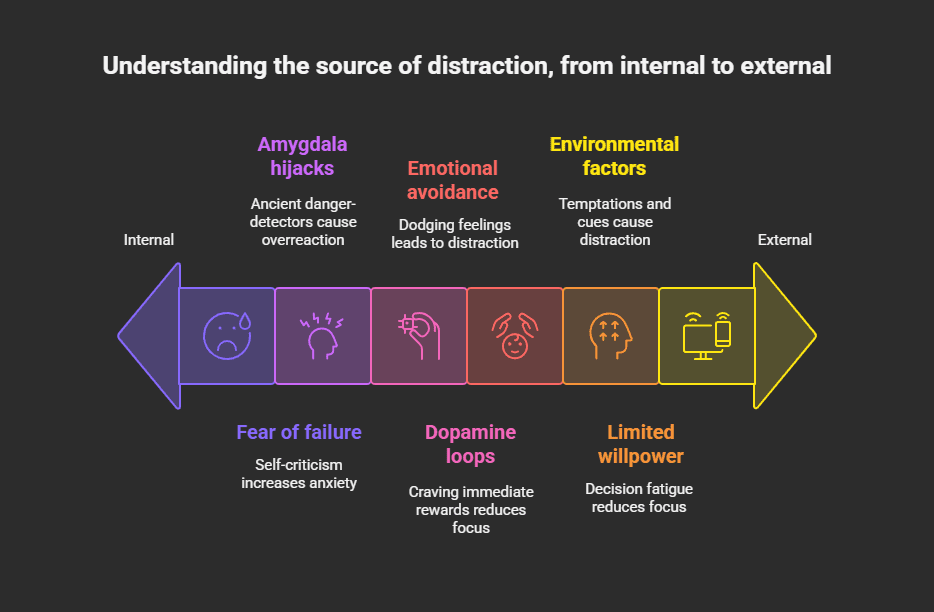Ever found yourself doom-scrolling through your phone when you really, really should be drafting that report? You’re not alone. Procrastination: it’s the art of putting off until tomorrow what you could’ve (and should’ve) done today. But here’s the kicker: there’s more going on beneath the surface than just a lack of willpower. Let’s spill the beans on the psychology of procrastination and the neuroscience of procrastination. We’ll dive deep, fear of failure, perfectionism, amygdala hijacks, dopamine loops, and emerge with a clearer picture of why people procrastinate (and hey, maybe a little self-compassion along the way).
A Little Backstory: Why We Delay
Picture this: You’re sitting at your desk. A blank page glares back at you. You feel that flutter in your chest, anticipation? Anxiety? A dash of dread? It’s all part of the same tangled web that neuroscience and psychology researchers call the root causes of delay.
Believe it or not, researchers estimate that up to 20% of adults meet the clinical definition of chronic procrastination, yes, it’s a thing, while the vast majority admit to procrastinating on occasion. And it’s not just about laziness. No siree. It’s about how our brains are wired, how emotions hijack our rational mind, and how our ancient survival mechanisms sometimes backfire in the modern world.
Fear of Failure: When the Inner Critic Steals the Show
Fear of failure. Two words, big impact. If you’ve ever felt paralyzed by the thought of “what if I mess this up?” you’ve danced with this culprit. Here’s the deal: Perfectionism and fear of failure are two peas in a pod.
- Perfectionism’s toxic side: At first glance, perfectionism can look like a blessing, high standards, attention to detail, and a fierce work ethic. But hang on. When the stakes feel impossibly high, perfectionism morphs into something else: an inner critic that whispers, “This work isn’t good enough,” or worse, “People will judge you.”
- The villainous cycle: That whisper creates anxiety. And high anxiety triggers avoidance behaviors, aka procrastination. You delay starting because you fear your performance won’t meet your own (or someone else’s) expectations.
(And yes, you’ll love this detail.) In psychological terms, this is called anticipatory anxiety: the dread of a future event so strong that your brain chooses distraction over action.
Clause nesting alert, By the time you’ve convinced yourself you’re not ready, after scrolling Instagram, reorganizing your desk, or suddenly “needing” coffee, the window for calm focus has slammed shut. You’ve let fear of failure win another round.
Perfectionism vs. Procrastination: A Love-Hate Relationship
Funny thing is, perfectionism and procrastination are often inseparable. If you set the bar at Olympic-level heights, of course, you’ll hesitate to begin. You might think, “Well, if I can’t do it perfectly, why even bother?”
- All-or-nothing thinking: Neuroscience shows that rigid thinking patterns, “I must ace this, or I’m worthless,” amplify stress hormones like cortisol. High cortisol levels don’t exactly sharpen your concentration; they send you straight into fight-or-flight mode.
- Brain region spotlight: The prefrontal cortex, responsible for planning and self-control, goes offline under stress. Meanwhile, the amygdala, the brain’s smoke alarm, lights up. And when the smoke alarm blares, rational thought? Poof.
Amygdala Hijacks: Ancient Alarm Bells Gone Rogue
Here’s a metaphor: your amygdala is like that overzealous town crier, always shouting “Danger! Danger!” even when the only threat is an unfinished spreadsheet.
- What happens in the brain: When a task triggers too much stress, the amygdala activates the sympathetic nervous system. (“Fight or flight,” as the textbooks say.)
- Why it matters: In prehistory, this mechanism helped us survive saber-toothed tigers. Today? It sometimes makes us avoid anything that feels emotionally intense, like writing a critical email, studying for an exam, or pitching a big idea.
Imperative time: Remember, it’s not your fault. Your brain is just doing its job, staying alive. But, ironically, by avoiding the discomfort, you often make matters worse (hello, looming deadlines…).
Dopamine Loops: The Siren Song of Instant Gratification
Here’s where it gets sneaky. Dopamine. The pleasure-and-reward chemical. When you check your phone and see a funny meme, dopamine spikes. You feel momentarily better. You forget about that project. You linger.
- The neuroscience of procrastination: Our brains are wired to seek immediate rewards and avoid immediate pain. And finishing your task? Painful in the short term. Scrolling social media? Instant hit of feel-good chemicals.
- The loop: You procrastinate → feel guilty → get a small dopamine hit from distraction → feel guilty because you didn’t work → repeat. It’s a feedback loop that keeps you stuck.
(Rhetorical question time.) Who doesn’t want to feel good right now? Exactly.
The Temporal Dimension: Present Bias and Time Perception
If you’ve ever heard of “present bias,” here’s the quick and dirty: We tend to over-value immediate rewards at the expense of long-term gains. That means writing the term paper tonight seems less appealing than binge-watching that new series.
- Time isn’t absolute: Neuroscientific studies suggest that our perception of time is malleable. When we’re bored or stressed, time drags, so we seek stimulation (hello again, social media). Conversely, when we’re engaged, time flies. But that initial engagement is the trick; fear of failure resists that leap.
Emotional Regulation: Why We Avoid Feelings
Procrastination isn’t just about tasks; it’s about emotions. Tasks are proxies for underlying emotions, fear, boredom, and shame. When you don’t want to feel something, you distract yourself. Simple, right?
- Emotional intelligence to the rescue: Recognizing your feelings can defuse their power. “Ah, I see I’m anxious about this presentation.” Naming it reduces the amygdala’s grip.
- Mind-body interplay: Neuroscience reveals that our insula, a pocket of cortex, monitors bodily sensations (heart rate, gut feelings). When we ignore or suppress emotions, the insula signals distress, and the amygdala kicks in again. Round and round.
The Role of Self-Compassion: A Gentle Antidote
Now, you might be thinking, “This all sounds bleak.” But here’s the twist: understanding the why empowers you to change the narrative. Enter self-compassion.
- What it is: Treating yourself the way you’d treat a friend. Noticing your struggles without judgment.
- Neuroscience nod: Studies show self-compassion activates the parasympathetic nervous system—the rest-and-digest side—counteracting the stress response.
(And yes, it works.) By cultivating self-compassion, you reduce the emotional charge around tasks. The brain’s smoke alarms calm down. You can begin.
Executive Function & Willpower: Limited Resources
We often think willpower is infinite. Ha. Neuroscience laughs at that. The prefrontal cortex, tasked with decision-making and impulse control, has a finite reservoir. It depletes with every tough choice, what to eat, when to check email, whether to keep working on that report.
- Decision fatigue: Ever noticed you’re more likely to procrastinate later in the day? That’s because your willpower bucket is running dry.
- Strategic scheduling: Do demanding tasks when you’re freshest, morning, for most folks. Save lighter chores for later. It’s a way to hack your brain’s limitations.
Social and Environmental Triggers: It Takes a Village
We’re not islands. Our environment, both physical and social, shapes procrastination patterns.
- Social norms: If your peers frequently postpone tasks, you’re more likely to join them. It’s contagious.
- Digital temptations: Notifications, pings, banners vying for your attention. They hijack your dopamine system.
- Workspace design: Cluttered desk? More friction to start. Distraction-free zone? Easier focus.
Imperative again: Tidy your workspace. Put your phone on silent. Turn off notifications. Small tweaks, big impact.
Putting It All Together: The Procrastination Puzzle

So, to recap the root causes of delay:
- Fear of failure & perfectionism: inner critics that ratchet up anxiety.
- Amygdala hijacks: ancient danger-detectors gone haywire.
- Dopamine loops & present bias: our brains’ craving immediate rewards.
- Emotional avoidance: dodging uncomfortable feelings via distraction.
- Limited willpower: decision fatigue that saps focus.
- Environmental factors: digital temptations, social cues, chaotic workspaces.
Yes, it’s complex. But complexity isn’t the enemy. Knowledge is power, especially when it’s about your mind.
Moving Forward: Strategies Rooted in Science
Okay, we’ve geeked out on the neuroscience of procrastination. Now, what? Here are a few science-backed moves:
- Break tasks into micro-steps: Tiny, doable actions reduce anticipatory anxiety. One paragraph. One bullet point. One sticky note.
- Set implementation intentions: “I will write for 25 minutes at 10 a.m. in the study.” Studies show this increases follow-through.
- Use timed focus sprints: Pomodoro technique, 25 minutes on, 5 minutes off. Resets your dopamine clock.
- Practice self-compassion breaks: When you catch yourself procrastinating, gently acknowledge it: “This feels tough right now. I’m not alone.”
- Mindfulness meditation: Strengthens prefrontal control over the amygdala. Just 10 minutes a day.
Who doesn’t love actionable tips?
Why This Matters: Beyond Deadlines
Procrastination isn’t merely a time-management glitch. It seeps into self-esteem, shapes career trajectories, and even impacts mental health. Chronic delay can fuel guilt, shame, and a persistent sense of underachievement. Worse, it perpetuates stress, turning deadlines into dread.
But here’s the bright side: as you learn the psychology of procrastination and the neuroscience of procrastination, you reclaim agency. You change the dialogue from “Why am I so lazy?” to “What’s happening in my brain, and how can I work with it, not against it?”
Parting Thoughts: A Compassionate Challenge
So, next time you catch yourself stalling, whether you’re asking why people procrastinate or just shaking your head at your delay, remember: it’s not about character flaws. It’s about brain wiring and emotional self-defense. With that insight, you can meet procrastination with curiosity instead of shame.
Give it a try. Take one micro-step on a task you’ve been avoiding. Notice what arises, anxiety? Resistance? Then, pause. Breathe. Acknowledge. And proceed. Because falling behind once isn’t a life sentence; it’s data. Data you can use to hack your habits.
After all, understanding the root causes of delay is the first step toward rewriting your story, from chronic put-offer to action-taker. And trust me, that rewrite? Totally within reach.






















